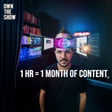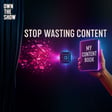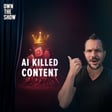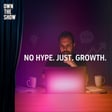
Ready or Not: AI's Inevitable Upheaval in the Marketing Realm #AIintheSky
In this episode of the AI-Driven Marketer, Dan Sanchez talks to Marc Angelos about AI. We're talking about the jump from the cool stuff GPT-4 is doing now to what's coming with GPT-5 – and how we marketers can get ahead of the game. Dan even shares a personal story about getting ready for marriage that surprisingly ties into prepping for AI's future. Plus, we've got hot takes on Sam Altman's big AI predictions (spoiler: they're kind of wild), the real-deal on personal brands, and a bunch of wicked smart advice on getting personal with AI-powered marketing. This episode is just stuffed with goodness for anyone ready to geek out on AI and make their marketing smarter. Grab your headphones and let's jump in!
Timestamps:
00:00 AI's impact on marketing discussed with expert.
08:44 Maximize marketing success by rethinking daily efforts.
14:40 Setting goals and documenting the journey's importance.
18:07 Sam Altman discusses the future of AI.
22:16 Prepare for future AI by collecting relevant data.
27:26 Rumors of Apple and Google discussing Gemini.
31:29 AI needs visionary leaders to succeed.
38:02 5G and AI will drive future marketing.
46:22 Sales discipline and networking crucial for success.
48:20 Effective selling and marketing is relationship building.
55:48 Teach AI to take baby steps for success.
59:29 Providing AI with context and templates for guidance.



![What’s Your Authority Score? [The 5-Factor Test] image](https://media.zencastr.com/cdn-cgi/image/width=112,quality=85/image-files/630c9f06819f8b3dba5fa460/cfbaccba-f587-45de-a41f-e2c99c15e2a5.png)
![The Audience Growth Engine [Full Framework] image](https://media.zencastr.com/cdn-cgi/image/width=112,quality=85/image-files/630c9f06819f8b3dba5fa460/46b84fd1-e856-4687-9aee-6b4a7e0bc7ff.png)



![The "Dream 100" Execution Plan [Google Sheet System] image](https://media.zencastr.com/cdn-cgi/image/width=112,quality=85/image-files/630c9f06819f8b3dba5fa460/fcd89374-76a4-4e58-a2e3-2bb7ddda4364.png)










